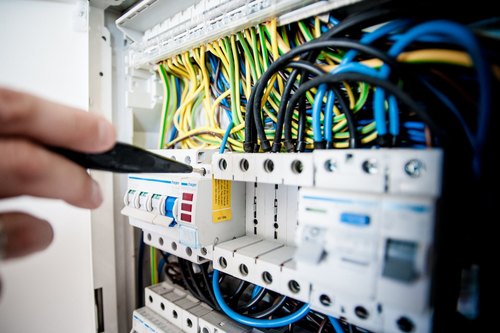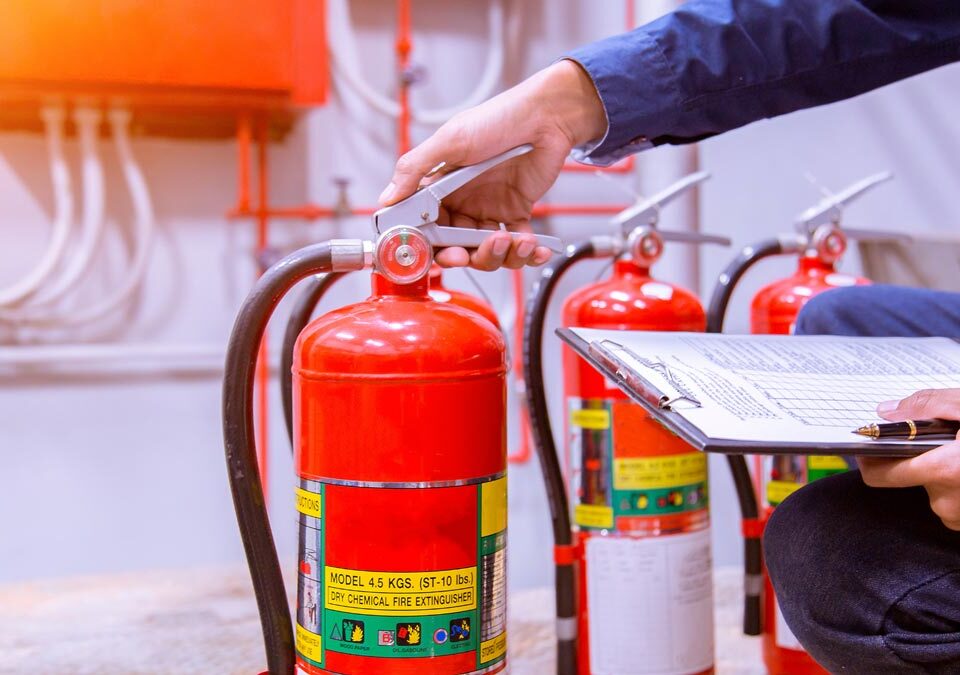Importance for electrical safety in industries

Crucial Safety Topics to Involve In Your Employee Safety Training Program
May 4, 2023
The Power of Behavior Based Safety: Creating a Culture of Prevention
May 5, 2023Importance for electrical safety in industries
Electrical safety in industries is not just necessary but imperative. There is a high risk of electrical hazards due to the heavy machinery and high voltage systems used in industrial settings. Without proper electrical safety protocols, the consequences could be catastrophic, such as death, severe electrical burns, and equipment/facility damage.An effective electrical safety program requires regular maintenance of electrical systems, providing personal protective equipment to employees, and incorporating proper lockout/tag-out procedures under all circumstances. Failure to follow these procedures could lead to significant financial losses and harm workers.
Businesses that prioritize electrical safety do not only protect their employees from potential hazards, they also increase productivity and profitability in the long run. Neglecting this aspect could lead to avoidable accidents and loss of life. Invest in electrical safety to ensure the safety of your employees and the growth of your business.
Importance for electrical safety in industries
Electrical safety in industries is not just necessary but imperative. There is a high risk of electrical hazards due to the heavy machinery and high voltage systems used in industrial settings. Without proper electrical safety protocols, the consequences could be catastrophic, such as death, severe electrical burns, and equipment/facility damage.An effective electrical safety program requires regular maintenance of electrical systems, providing personal protective equipment to employees, and incorporating proper lockout/tag-out procedures under all circumstances. Failure to follow these procedures could lead to significant financial losses and harm workers.
Businesses that prioritize electrical safety do not only protect their employees from potential hazards, they also increase productivity and profitability in the long run. Neglecting this aspect could lead to avoidable accidents and loss of life. Invest in electrical safety to ensure the safety of your employees and the growth of your business.
Electrical safety is a crucial aspect that must be considered in every household and workplace. A common misconception is that electrical accidents only occur in high-risk environments such as construction sites or factories. However, the truth is that electric shocks, fires, and other electrical hazards can happen anywhere at any time. In this blog post, we will explore the importance of electrical safety, some common electrical hazards to watch out for, and practical tips for preventing accidents. By the end of this post, you will have a better understanding of how to keep yourself and those around you safe from electrical hazards
The Importance of Electrical Safety
Electrical safety is a serious matter that should not be taken lightly. Every day, people are exposed to electrical hazards that could cause harm or death. That’s why it is essential to prioritize electrical safety in all aspects of life. From installing electrical systems to operating machines, electrical safety must be a top priority.Ignoring electrical safety protocols in workplaces or homes can lead to catastrophic consequences. From electrical fires to electrocution, these hazards can result in severe injuries and even death. In addition to physical harm, electrical hazards can have significant financial implications, such as property damage and lost productivity.
Electrical safety can prevent these hazards from happening in the first place. By following proper safety protocols, an individual can reduce the risk of electrical accidents, both in the workplace and at home. An investment in electrical safety shows a commitment to the well-being of oneself and others. Overall, the importance of electrical safety cannot be overstated and should be taken seriously.
Common Electrical Hazards to Watch Out for
Electricity is a powerful and unpredictable force that can cause a wide range of hazards in our daily lives. Some common electrical hazards to watch out for include damaged or frayed electrical cords, overloaded circuits, and exposed wiring. It is also crucial to take precautions when handling electrical devices, such as ensuring that hands are dry and avoiding using electrical devices near water. In the workplace, the most common electrical hazards include being struck by an electrical current or arc flash, or suffering from an electrical explosion due to faulty wiring or equipment. By being aware of these hazards and taking precautions to mitigate the risks, individuals can reduce their chances of suffering from electrical-related accidents. Remember, electrical safety is essential for both workplace and household settings, and should never be taken for granted.
Identifying and Dealing with Overloaded Circuits
Overloaded circuits can be a pervasive electrical hazard in both workplaces and households. This occurs when more electrical current flows through a circuit than it was designed to handle. Overloaded circuits can cause circuit breakers to trip or fuses to blow, and in severe cases, can cause electrical fires. To identify overloaded circuits, look for signs such as flickering or dimming lights, frequently tripping circuit breakers, or warm electrical outlets. To prevent overloaded circuits, make sure to spread out electrical usage across multiple circuits. Do not overload power strips or electrical outlets, and use devices that draw high amounts of electricity, such as space heaters or refrigerators, on separate circuits. Most importantly, never ignore signs of potential electrical hazards and contact a certified electrician to inspect overloaded circuits promptly. Remember, electrical safety starts with awareness and taking the necessary precautions to identify and address electrical hazards promptly.
How to Choose and Maintain Electrical Systems and Equipment
When it comes to choosing and maintaining electrical systems and equipment, it is critical to prioritize electrical safety. A good place to start is by selecting equipment that meets safety standards such as UL (Underwriters Laboratories) listings. Regular maintenance checks such as monitoring equipment for wear and tear, testing grounding systems, and ensuring that circuits are correctly labeled will help prevent dangerous electrical incidents.Equipment should also be regularly cleaned of any build-up utilizing preventative measures such as insulating materials. Keep an up to date inventory of all electrical equipment, including manuals, maintenance logs, and replacement parts, to ensure that everything is correctly maintained, and nothing falls through the cracks. Keep in mind that investing in proper electrical equipment and maintenance can save you in the long run, both in safety and financial terms.
Ensuring Safe Electrical Wiring Practices
When it comes to ensuring electrical safety, safe wiring practices are essential. Faulty electrical wiring can lead to electrical shocks, fires, and other hazards. Therefore, it is critical to follow safe electrical wiring practices, such as using the correct gauge of wire for the job and using appropriate wire connectors to join wires.Moreover, the use of power tools is a primary cause of electrical accidents during wiring installations. It is essential to use power tools correctly and safely. Make sure to use only grounded tools, never remove the grounding prong from a cord, and always diagnose the power tools using the correct safety standards.
Always ensure the use of GFCI (Ground-Fault Circuit Interrupter) protégé in areas where electricity comes in contact with water, such as kitchen and bathroom areas. GFCIs will immediately switch power off should an electrical danger occur.
Remember, when it comes to electrical wiring, it’s better to be safe than sorry. Employing safe electrical wiring practices can save you and your loved ones’ lives and ensure the proper functioning of your electrical system.
What to Do in Case of Electrical Emergencies
In case of an electrical emergency, it is crucial to stay calm and act swiftly. The first step is to immediately cut off power supply by switching off the power source or unplugging electrical equipment. If the emergency is not severe, such as a minor electrical burn, clean the affected area with cold water and seek medical attention if necessary.However, if the situation is more severe, do not attempt to handle it on your own. Call for emergency services right away. Do not attempt to touch or move any electrical equipment or wires, as this could lead to electrocution.
It is also essential to have an emergency action plan in place for your workplace or home. Ensure that all members are trained on how to handle electrical emergencies and that emergency phone numbers are easily accessible. With the right precautions and preparedness, you can minimize risks and prevent electrical emergencies from turning into more dangerous situations.
Protecting Yourself from Electrical Shock
Electrical shocks can be life-threatening, and it is crucial to protect oneself from them. To avoid electrical shocks, always ensure that your hands are dry and avoid handling electrical devices near water. Check for damaged or frayed cords and replace them immediately. When dealing with electrical equipment, use non-conductive gloves and shoes with a rubber sole to insulate against current flow. Additionally, be vigilant when working with electrical sockets and wiring and never touch a live socket with wet hands or any metal object. Stay updated with electrical safety guidelines, and never take shortcuts when dealing with electrical equipment. Remember, protecting yourself from electrical shocks requires vigilance and knowledge, but it can save your life.
Staying Safe During Electrical Storms
Electrical storms can be awe-inspiring, but they are also a significant hazard. Lightning can strike power lines, homes, and trees, causing dangerous electrical surges that can severely damage or destroy electrical equipment and cause fires. Staying safe during electrical storms can be challenging, but there are several precautions you can take. Firstly, unplug all electrical equipment and appliances, including televisions, computers, and small appliances. Avoid taking showers or using water during the storm, as water is a conductor of electricity, even indoors. It is best to stay away from windows and doors, which can conduct electricity.
If caught outside during an electrical storm, seek shelter in a substantial building or vehicle away from open fields, trees, and bodies of water. If no shelter is available, crouch low to the ground and avoid placing your hands on the ground.
Always be aware of weather forecasts and keep an emergency kit handy. With the right precautions, you can protect yourself and your loved ones from electrical storm hazards.
Creating a Culture of Electrical Safety at Home and Work
To truly prioritize electrical safety, creating a culture of safety at home and work is crucial. This involves educating and training all individuals on proper electrical safety protocols, providing personal protective equipment such as non-conductive gloves and rubber-soled shoes, and conducting regular electrical safety checks. It’s important to encourage everyone to speak up if they notice an electrical hazard, and to never ignore potential risks. Leaders can lead by example by consistently following electrical safety protocols, and empowering their teams to do the same.
By creating a culture of electrical safety, individuals are not only protecting themselves from potential hazards but also ensuring the safety of their colleagues and loved ones. Remember, safety is everyone’s responsibility, and it starts with building a community committed to the importance of electrical safety.
Inspiring Innovations in Electrical Safety
Innovations in electrical safety have greatly improved the safety of workplaces and households. One example is the development of smart sensors that detect when electrical systems are overloaded or have malfunctioned, preventing electrical fires and other hazards. Another innovation is the use of virtual and augmented reality for training workers on electrical safety protocols, promoting a safe environment. There are also new safety tools and equipment, such as arc-fault circuit interrupters (AFCIs) and ground-fault circuit interrupters (GFCIs), which can detect and prevent dangerous electrical currents. Nickel-tin oxide, a new type of electrically conductive material, is also being researched to make electrical systems more efficient and safer.
These exciting innovations show that electrical safety is always evolving and improving, and we should look forward to more advancements in the future. As a community, we should work together to prioritize electrical safety and make use of these innovations to promote a safer environment for all.
In conclusion, electrical safety is of utmost importance. Electrical hazards can be fatal, and prevention is key. It is essential to follow safety procedures and wear protective gear when working with electricity. Ensure that all electrical equipment is up to code and is inspected regularly. Regularly inspect electrical cords for frays and cuts and always turn off electrical equipment before working on it. If you find yourself in an unsafe electrical situation, seek professional help immediately. By taking these necessary precautions, you can reduce the risk of electrical accidents and ensure the safety of yourself and others. Remember, safety is always the number one priority. You may contact us at info@thesafetymaster.com or +917665231743 or www.thesafetymaster.com TSM TheSafetyMaster Private Limited
We may conduct
Electrical Safety Audit
Thermography Study
Electrical Safety Documentation, procedure and Training
Residual Life Assessment Studies
Arc Flash fire assessment




